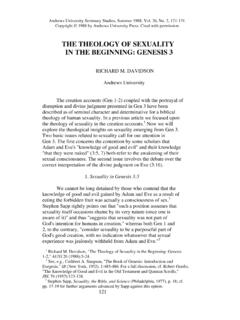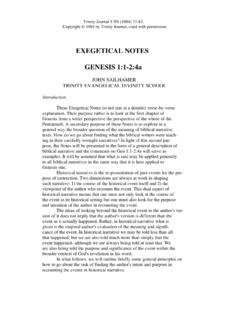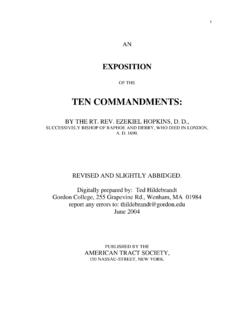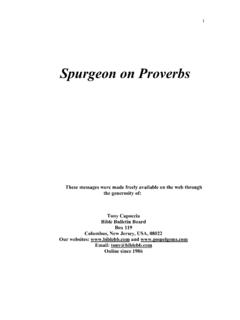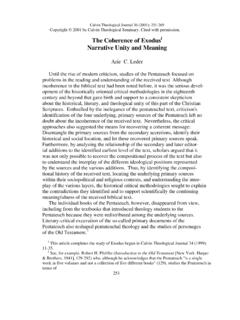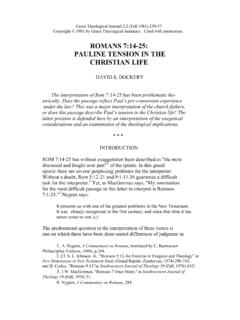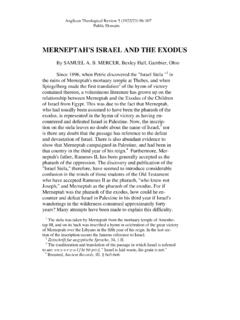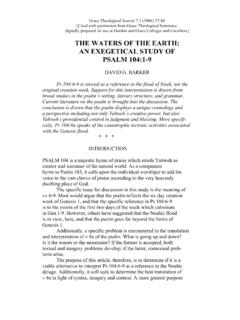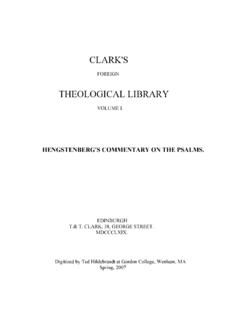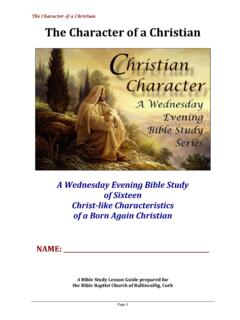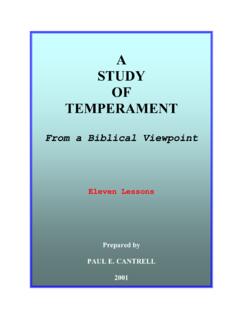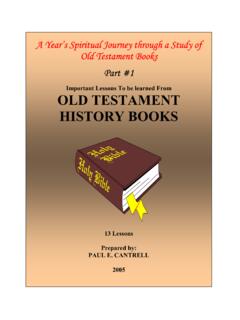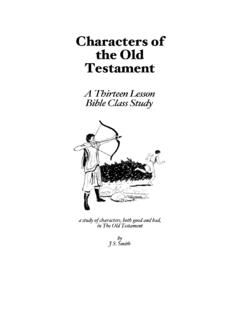Transcription of The Curse of Canaan - Gordon College Faculty
1 Bibliotheca Sacra 137 (1980) 223-40. Copyright 1980 by Dallas Theological Seminary. Cited with permission. studies in the Book of genesis Part 1: The Curse of Canaan Allen P. Ross The bizarre little story in genesis 9:18-27 about Noah's drunkenness and exposure along with the resultant cursing of Canaan has perplexed students of genesis for some time. Why does Noah, the spiritual giant of the Flood, appear in such a bad light? What exactly did Ham do to Noah? Who is Canaan and why should he be cursed for something he did not do? Although problems like these preoccupy much of the study of this passage, their solutions are tied to the more basic question of the purpose of the account in the theological argument of genesis .
2 genesis , the book of beginnings, is primarily concerned with tracing the development of God's program of blessing. The bless- ing is pronounced on God's creation, but sin (with its subsequent Curse ) brought deterioration and decay. After the Flood there is a new beginning with a renewal of the decrees of blessing, but once again corruption and rebellion leave the human race alienated and scattered across the face of the earth. Against this backdrop God began His program of blessing again, promising blessing to those obedient in faith and cursing to those who rebel. The rest of the book explains how this blessing developed: God's chosen people would become a great nation and inherit the land of Ca- aan. So throughout genesis the motifs of blessing and cursing occur again and again in connection with those who are chosen and those who are not.
3 An important foundation for these motifs is found in the oracle of Noah. Ham's impropriety toward the nakedness of his father prompted an oracle with far-reaching implications. Ca- 223 224 Bibliotheca Sacra-July-September 1980 naan was cursed; but Shem, the ancestor of Israel, and Japheth were blessed. It seems almost incredible that a relatively minor event would have such major repercussions. But consistently in the narratives of genesis , one finds that the fate of both men and nations is determined by occurrences that seem trivial and commonplace. The main characters of these stories acted on natural impulse in their own interests, but the narrator is con- cerned with the greater significance of their actions. Thus it becomes evident that out of the virtues and vices of Noah's sons come the virtues and vices of the families of the purpose of this section in genesis , then, is to portray the characteristics of the three branches of the human race in rela- tion to blessing and cursing.
4 In pronouncing the oracle, Noah discerned the traits of his sons and, in a moment of insight, determined that the attributes of their descendants were em- bodied in their Because these sons were pri- mogenitors of the families of the earth, the narrator is more interested in the greater meaning of the oracle with respect to tribes and nations in his day than with the children of Shem, Ham, and , the ancestor of the Shemites to whom the Hebrews belonged, acted in good taste and was blessed with the possession of the knowledge of the true God, Yahweh. Japheth, the ancestor of the far-flung northern tribes which include the Hellenic peoples,4 also acted properly and thus shared in the blessing of Shem and was promised geographical expansion. In contrast, Ham, represented most clearly to Israel by the Egyptians and Canaanites, acted wrongly in violating sexual customs regarded as sacred and as a result had one line of his descendants cursed with the oracle of Noah, far from being concerned simply with the fortunes of the immediate family, actually pertains to vast movements of ancient Portraying their tendencies as originating in individual ancestors, the book of beginnings an- ticipates the expected destinies of these tribes and nations.
5 Vos fittingly notes that it occurred at a time when no event could fail to influence The Prologue (Gen. 9:18-19) genesis 9:18-19 provides not only an introduction to this narrative but also a literary bridge between the Flood narrative The Curse of Canaan 225 and the table of nations. The reader of genesis is already familiar with the listing of the main characters of this story: Noah and his three sons Shem, Ham, and Japheth (5:32; 6:10; 7:13; 9:1; and later in 10:1). But in this passage two qualifications are supplied. They were the sons of Noah who came out of the ark, and they were the progenitors from whom all the nations of the earth originated. The first description connects the characters to the Flood account, and the second relates them to the table of nations.
6 Of greater significance for the present narrative, however, is the circumstantial clause in verse 18, "Now Ham was the father of Canaan . " Many have thought that this is a primary example of a redactor's attempt to harmonize the deed of Ham and the Curse of Canaan portions of this If that were the case, it could have been done more effectively without leaving such a rough trace. The point of this clause seems rather to show the connection of Canaan with Ham. However, far from being merely a genealogi- cal note, which would be superfluous in view of chapter 10, the narrative is tracing the beginnings of the family and shows that Ham, acting as he did, revealed himself as the true father of The immediate transfer of the reference to Canaan would call to the Israelite mind a number of unfavorable images about these people they knew, for anyone familiar with the Canaanites would see the same tendencies in their ancestor from this decisive beginning.
7 So this little additional note anticipates the proper direction in the story. The Event (Gen. 9:20-23) NOAH'S BEHAVIOR The behavior of Noah after the Flood provided the occasion for the violation of Ham. Noah then acted so differently from before the Flood that some commentators have suggested that a different person is in view But the text simply presents one person. The man who watched in righteousness over a wicked world then planted a vineyard, became drunk, and lay naked in his tent. Or, as Francisco said it, "With the opportunity to start an ideal society Noah was found drunk in his tent."11 This deterioration of character seems to be consistent with the thematic arrangement of at least the early portion of genesis , if not all of the book. Each major section of the book has the heading tOdl;OT hl.
8 ,xe, commonly translated "these are the genera- 226 Bibliotheca Sacra - July-September 1980 tions of." The narratives that follow each heading provide the particulars about the person, telling what became of him and his descendants. In each case there is a deterioration from beginning to end. In fact the entire Book of genesis presents the same pattern: The book begins with man (Adam) in the garden under the blessing of God, but ends with a man (Joseph) in a coffin in Egypt. The tOdl;OT of Noah began in 6:9 with the note that Noah was righteous and blameless before the LORD, and ended in 9:18-27 with Noah in a degraded condition. But it was a low experience from which God would bring brighter prospects in the future. Noah, described as a "man of the soil" (9:20), began by plant- ing a vineyard.
9 This epithet (hmAdAxEhA wyxi) is probably designed to say more than that he was a human farmer. In view of the fact that he is presented as the patriarch of the survivors of the Flood, Noah would be considered as the master of the earth, or as Rashi understood it, the lord of the two verbs ( .. lH, ) in the sentence are best taken as a verbal hendiadys, "he proceeded to plant" a vineyard. Whether he was the first man in history to have done so is not stated, but he was the first to do so after the Flood. The head of the only family of the earth then produced the vine from the ground that previ- ously produced minimal sustenance amid thorns. The antediluvian narratives represent various beginnings, none of which appear particularly virtuous. Besides Noah's be- ginning in viticulture, the first "hunter" is mentioned in 10:8.
10 Nimrod was the first (lHehe) "to be a mighty warrior on the earth." And in 11:6, concerning the activities of Babel, the text reads, "they have begun ( ) to do this." The use of the same verb in all these passages provides an ominous note to the stories. The planting of the vineyard, however, appears to be for Noah a step forward from the cursed ground. Since Lamech, Noah's father, toiled under the Curse ,13 he hoped that his son would be able to bring about some comfort (5:29) and so he called him Noah, which means "comfort." Perhaps Noah hoped that cheer and comfort would come from this new venture. The vine in the Bible is considered noble. The psalmist de- scribed the vine as God's provision, stating that it "gladdens the heart of man" (104:15). A parable in Judges has a vine saying, "Should I give up my wine, which cheers both gods and men?
